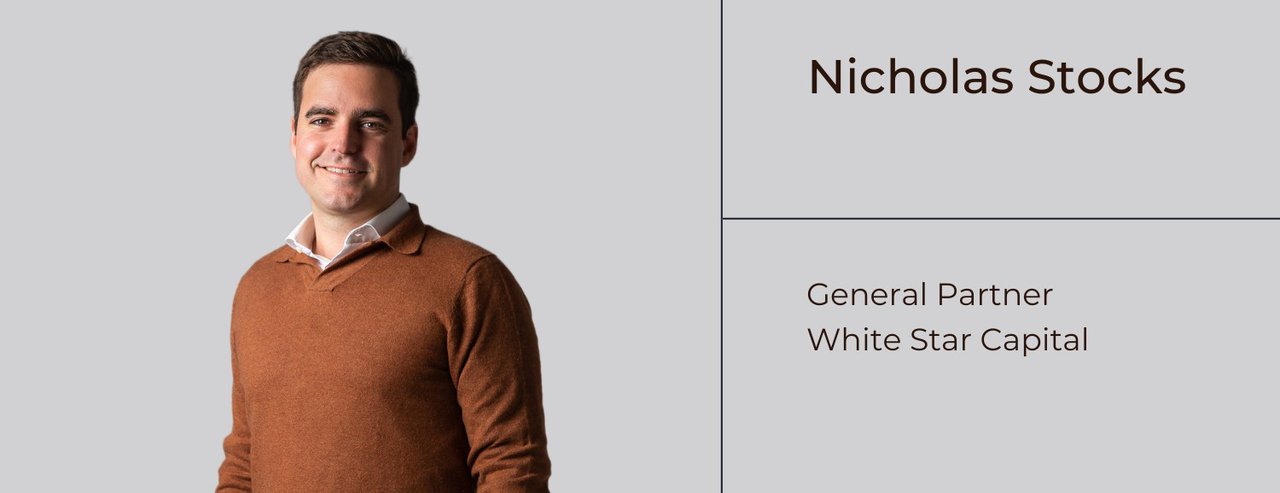Nicholas Stocks, White Star Capital: How does the Polish ecosystem look? Global investor perspective
Poland is starting to regularly appear in the sights of global VC's. What do they look at when approaching Polish startups? How does the ecosystem look like from a US perspective? Should a Polish startup consider working with a global VC and how can they both benefit?
Paweł Chełchowski: You are a global VC with offices across North America, Europe, and Asia. You have two Polish companies in your Portfolio – Uncapped and Packhelp. What made you invest in Poland?
Nicholas Stocks - We never invested in the companies because we looked at them and said “oh, they're Polish, this is great”. The companies that we invested in could have been founded anywhere in the world. These were companies that we felt had very strong founders with an international mindset from the very beginning. Both sets of founders are very commercially savvy. They have been able to use the competitive advantages of the Polish market, such as the great talent that’s relatively cheaper than in other markets and certain industries. For example, Poland is the packaging capital of Europe, so for Packhelp it was easier to offer a service that is cheaper and better than what other startups would be able to provide elsewhere in Europe or North America.
Paweł Chełchowski: And for Uncapped – they are headquartered in the UK, but they have Polish founders, Polish developers, but they are more international.
Nicholas Stocks: I don’t have the latest numbers, but Uncapped is a fully remote company. Still, a significant amount of their staff is Polish.
PC: Do you think that your investment or generally foreign investment is necessary for the Polish company to grow abroad? Does it make it easier for them to reach their markets through your networks or your contacts, or can they do it on their own?
NS: Great question. There are some funds in Poland – like Inovo, Market One and quite a few others, that are exceptional partners for the first stage of a company’s life. Companies that we like to back however do get to a certain stage where they have to expand abroad to fulfil their ambitions. This requires a strong network, which can be augmented by international follow-on investors. It is always going to be hard for a local fund to build an international network of clients, potential senior hires, or suppliers for further expansion, so a firm like White Star Capital can help bring them to the table in the USA, France and so on.
I think a Polish startup can benefit tremendously from having strong local investors and strong international investors working side by side. If, for example Packhelp needs to hire someone locally, it's not for White Star to help, it’s Inovo, but if they are looking to speak to companies that are in the UK or the US, we are the ones that step up. Founders should always be thinking about points of differentiation and cohesion between funds as they scale through different funding stages.
PC: Locally, we also have this issue with Polish unicorns – some say there are almost none, while companies such as Dealroom includes companies that were fully bootstrapped as Polish unicorns – such as Allegro, InPost or CD Projekt. It is kind of weird that we differ from our local perspective – still these companies were not considered startups when they were founded, as our ecosystem is so extremely young. I think it is not only the case in Poland, but in the whole ecosystem in general.
NS: Generally, when people think about startups, they mistakenly, in my view, talk only about VC-backed companies. But Poland is unique in that it had a generation of these huge tech successes that were bootstrapped. When I talk to people about Polish tech companies, I name the ones you mentioned, to highlight that people really need to dig in and see the size of these companies to understand there is real quality of opportunity here in Poland, and that it has a successful track record already.
Going forward, I think Poland really needs sell these success stories, tell their stories whether they were VC-backed or not, for international investors to better understand the landscape. On the other hand, I really hope that the Polish founders don’t lose sight of the benefits of keeping their business bootstrapped or cash-efficient, because if an entrepreneur can bootstrap their business to a unicorn evaluation - that is phenomenal.
For a long time, Poland was considered an IT hub that companies used to hire developers, either outsourced or insourced locally for a long time. Did you notice that it changes? Do you see a lot of these people coming from big companies to starting their own thing and how does it shape our landscape?
I noticed quite a few times where we were either hiring or speaking to entrepreneurs, that they have background in one or a few big tech companies. Consulting firms also have big presence in Poland, like Bain & Co or BCG, with founders coming from. I think it's a huge positive because they're basically training everybody in what world-class looks like. Poland has phenomenal talent and universities for computer science, but then you need the professional training grounds to develop this talent further. The opportunity to work in these big international offices is a good start from which they can move on to working in startups or launch their own entrepreneurial journey.
For now, I think the focus for the ecosystem should be working with the commercial talent. There are more and more questions on developing world-class salespeople, and how to entice the best sales leaders to work for the startups that are out there.
So do you think there's this overrepresentation of tech in Polish startups? Do you feel that our startups a have issues with selling what they have?
Yes, it's one of the broader challenges we see in the market. I've spoken to startups that consist of a team of product people, they develop great products and are focused on that. What they don't love doing is selling their products. They'd much rather spend their time building incredible solutions, which is a strength, but ultimately if you're not spending time selling, it’s not going to work.
I think in Poland, it’s important to find that balance now. The ecosystem has great products, great tech companies, and with serial entrepreneurs that have had some success with angel investing now mentoring the next generation of founders, I believe we’ll see a lot of positive change.
Do you feel there is this issue in Poland, connected with being a mid-sized country, that it’s enough to grow locally and build your company in Poland, and going abroad might be some future step they will think about, but don’t really have a mindset to focus on it? Can a global VC also help here?
I think it might have to apply more to consumer companies than business-to-business companies. If you look at the Polish market, it is sizable, but also not big enough when compared to the likes of the US market, to enable many $1,000,000 outcomes. It's also not small enough to force you to go to international immediately. I think founders here need to be very conscious of how they build their business to balance these things out, and if they personalize the product too much for Poland, it might then be far harder to scale internationally.
Again, this is a case of local VC’s and international VC’s working very close together to help the companies navigate this. From our perspective it’s always the question that we ask ourselves when we want to back Polish companies – whether they take advantage of the best there is about being in Poland while also considering that their revenue base will be global.
The final question – do you see that Polish founder are underselling their product a lot? I also think that another cultural issue we have is a fear of failure, do you think these issues make Polish start-ups less competitive, and can they be overcome?
We’ve analysed global ecosystems based on different factors and ordered them based on their relative age compared to each other. Where we see the Polish ecosystem is about five years behind Germany in terms of maturity and success. If I go back to the Germany ecosystem 6-7 years ago, effectively they had Rocket Internet – a startup builder that was seeding a lot of startups with young entrepreneurs in the driver seats. They weren't afraid of failing because they had a safety net, they were young and they were funded. That really pushed on the German psyche. Today this is not a question that we have any more in the market.
With Poland, as we start seeing more and more successful entrepreneurs, it inspires another generation, I think we'll start having more people going down the entrepreneurial route and not being afraid to fail. As you're younger, by nature, you can take those chances and really go for it. So I think it's really just a matter of time and market maturity.
I see this mindset to this day in markets that are roughly at the same point of development. Like the Portuguese market which I am very familiar with, the Italian market, other CEE markets, that are also very similar in terms of maturity, and we see this topic coming up time and time again – being risk averse, scared of failure, people that are not willing to take risks, because they feel comfortable working at a very large company. This kind of mentality has really shifted in places like the UK, Germany, France, and Poland will, from our perspective
Thanks for the conversation!





